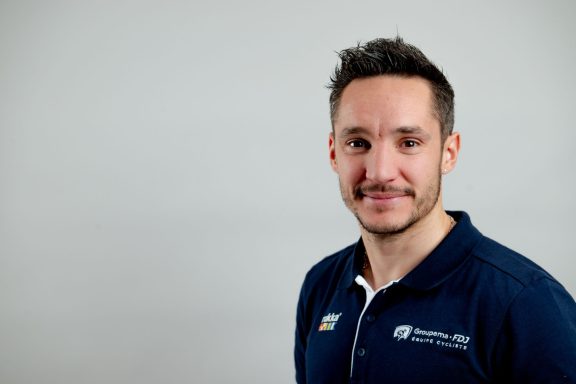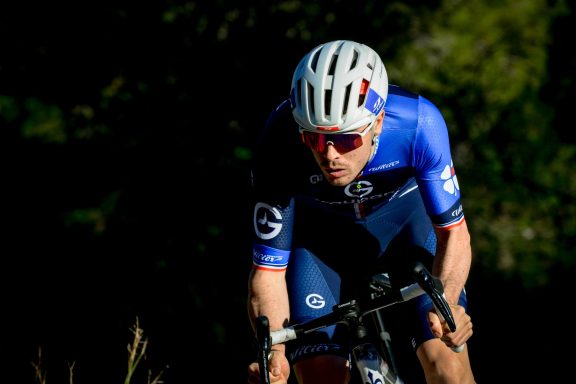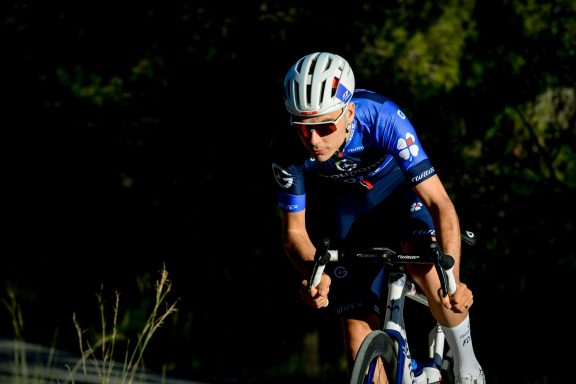The “Conti” Groupama-FDJ’s second year is coming to an end. A bit more than a week after its last competition on the road, namely the Youth French Championships, the development team is already looking to 2021 with quite a reshaped roster (see bottom of the page). In the meantime, team’s manager Jens Blatter agreed to talk in detail about this special season.
Jens, what is your overall assessment of the Conti’s season?
We have had a difficult season, like many other teams, and unfortunately we have been unable to do that many races. Due to the health situation, we had to deal with many unforeseen events. It was especially difficult for the riders in their last year as U23. They had a certain amount of pressure, they needed to perform well. On our side, next year’s recruitment proved to be more complicated than usual and we also had to maintain a high level of motivation within the team, which we managed to do. In the end, we still had the opportunity to do some good races, although that was not what we had expected at the start of the season. The balance is also very good since we have brought four riders to the WorldTour: three in our mother team and one elsewhere. I’m just a little sad for some riders who haven’t been able to do what we planned. Not everyone has been able to fully show himself. Žiga (Jerman), for example, was only able to do two races with us. As the “Conti” manager, I obviously want the best for the team, but I also want the best for the riders.
“The link with the WorldTeam worked perfectly”
In terms of results, are you up to your expectations?
Overall, I think we’ve had a good season. We could have done a little better, especially at the Giro, but we got unlucky with Lars getting injured a bit before and Sylvain crashing early in the race. On paper, we had a team to aim very high but luck was not on our side. Apart from that, we always were there. It wasn’t always easy as we also helped out the WorldTeam a lot, sometimes from one day to the next. Helping the mother team was a big goal for us too, since they were sometimes competing in 3-4 races at the same time. We were able to fulfil this mission while keeping on doing results on our own. For instance, Yakob Debesay was third on the Tour of Lombardy. We also aimed for Paris-Roubaix and Liège-Bastogne-Liège, but unfortunately they were cancelled. We managed to perform well when we wanted to, although the results are not what matter the most. We are racers of course, and we always want to win, but our main goal remains to train and develop the young riders, and then make them reach the WorldTour. In that matter, eight did so in the last two years. I don’t believe any other development team achieved that.
Did all the riders have a way to show themselves in this very tight season?
Actually, all the great climbing races except Liège-Bastogne-Liège were maintained. With the Tour de Savoie-Mont Blanc, the Ronde de l’Isard and the Baby Giro, the climbers really had the opportunity to get some results. For the rouleurs and sprinters, that was more of an issue. Over the two and a half months of competition, there was almost nothing but mountain races. A young sprinter like Paul Penhoët, for example, couldn’t do a lot of races with the Conti. We didn’t have any race suited to him. Fortunately, there was the WorldTeam. Like Žiga, Paul was able to do a few days of racing with them, and we were lucky to have that option. Otherwise, some would have finished the season with barely one or two race days.
Since this year, riders from the Conti could take part in some races with the WorldTeam. How did that go in your opinion?
I think the link between the two teams worked perfectly. A lot of riders were able to compete in the upper level, but our staff also was able to help. Everything went well, although it wasn’t planned like that initially. At the start of the season, we planned the potential exchanges. It was a long-term plan. We then knew more or less who would go where. Eventually, over the two and a half months of competition, it was more short-term decisions. It was not easy for the riders, for the coaches, or even for the travel arrangements. Still, I believe the balance is very good. We did manage to handle this situation and we received a lot of very good feedback from the WorldTeam about our riders. Not only were they always very motivated, but they also rode really well for the team. Obviously, they don’t all have the abilities to be in the finale or to achieve results in a race of 200 kilometers yet. Nevertheless, they did what they were told to do. I also want to emphasize two things. Firstly, the gap is huge between the Conti and the WorldTeam, so doing a year of “exchanges” like we did can help doing the transition. Secondly, I think that when the WorldTeam ran out of riders in years past, they sometimes had to take someone with poor motivation to complete their roster. Now, we can promote a youngster from the Conti, and he will certainly be 100% motivated and willing to do whatever is asked of him. These are two very important points.
“I don’t think that many teams have our record”
Aside from the riders, the Conti also provided some staff to the WorldTeam.
This is also one of our goals. We want to train riders, but also train young staff, such as mechanics, sports assistants, coaches and sports directors. I think everyone got to do a race with the WorldTeam, and it worked really well. It was also a special year as the mother team was sometimes doing 3-4 different races at the same time. I only had good feedback from that point of view as well, and the staff we currently have in the Conti could be the future staff of the WorldTeam. They’re up to it anyway.
What are you feeling seeing three other Conti riders moving into the WorldTeam?
On the one hand, we’re proud of course, because I don’t think that many teams have this record. In our first two years, only three of our riders did not advance to WorldTour or Pro Continental. We’re proud about it then, but above, this is the result of the work done with the coaches and sports directors. This shows that we are doing a good job and that the riders are ready to take it to the next level. It is also very important that everyone manages to find something after. Like I said, I’m the team manager first, so we try to keep as many of them for the mother team. But as soon as there is no more free spot, it is just as important to help the other riders. This has always been my philosophy and I think it is also that of the Groupama-FDJ team and Marc [Madiot]. We were able to help a few riders last year and this year to find other teams. We also have the responsibility of not letting the riders in a difficult situation.
In two years, eleven riders from the Conti joined the upper divisions. Do you feel that the team is gaining a real reputation?
Just as an example, since May-June, we receive every day between 10 and 15 requests from riders who want to join our team. Among them, there are some very good riders. Young riders don’t necessarily pay attention to money. Rather, they look at the possibilities of getting into the WorldTour afterwards, because that is their ultimate goal. Over the past two years, they have noticed that when you come to the Conti, you have a great chance to go WorldTour, whether in our mother team or elsewhere. I always tell my riders that being in the Conti Groupama-FDJ allows them to be seen. All agents, managers and sports directors look at them. I think it’s a lot easier to move up to the next level once you’re on a development squad like ours.
“Our goal remains to train young riders”
The 2021 roster was recently announced, with eight new riders. How did you approach recruiting in this particular year?
We looked at the most important U23 races. In the junior ranks, there were unfortunately hardly any international events. We still looked at 2-3 races, like the Grand Prix Rüebliland, that could take place. We were also in touch with riders who had achieved results in past years, and I also had a lot of interaction with riders agents. Due to the lack of races, it was even more important this year. Some suggested us riders, giving us their values and their tests. All of this made for a good starting point to start recruiting, and I think we have a very good team for next year.
Once again, there will be a mix of riders coming from the junior ranks and riders ending their U23 period.
At the end of last year, we decided to focus on juniors, as I did at BMC at the time. In the end, we took a few older riders because there were very few junior races to form a proper opinion. In addition, the competition gets tougher every year. Five or six years ago, we were almost the only development team with BMC, and I could really choose the riders I wanted. Now, all WorldTour teams are starting to have a continental team, so it becomes much more complicated to take all the youngsters we are interested in. The squad is a bit younger for next year, but it’s also very important to take some older riders on board. For example, Antoine Raugel, who will be in his final year as U23 in 2021, will bring us a lot of experience. It’s really important to have young boys, but it’s also important to have one or two riders who have a little more experience. We can also say that the exchanges over the season with the WorldTeam are a little easier with a rider in his late U23 years than with a rider coming out of the junior ranks. That being said, our long-term goal remains to train young riders. It is no longer possible for a rider to spend one or two years completing his development in the WorldTour. In 2020, you have to go through a continental team or a B-squad to be well trained, on and off the bike. You have to be ready and to have completed your development when you enter at the high level. This is also why we will try to take even more juniors in 2022. I always say that if you take a junior who performs really well, you have a 50% chance that it will be a wonderkid. If you take a rider in his last year as U23, he can be a very solid rider, but it’s probably not a wonderkid. Otherwise, he would already be in the WorldTour elsewhere. This is also what we’re interested in: seeking and finding wonderkids in the juniors.
How did the headquarters in Besançon work this season?
Because of the health situation, it obviously was more complicated this year. The riders returned home in mid-March and came back four months later. During this period, we were unable to do any training. Then, we also had three very intense months of racing with both the Conti and the WorldTeam. It was actually difficult to train the riders as we had planned. So we got together over the past few weeks to think about what could be improved in that matter. For 2021, we plan to do 2-3 training courses per week. That’s the path we want to take with our young riders. For some days now, everyone has returned home. There is no one left in Besançon. We had planned to do a training camp in December, but nothing is certain at the moment. We are also considering what we could put in place if the camp does not take place. There could be training in videoconference. Everything might be a bit complicated over the winter but we’ll hopefully get back to a more ordinary situation by the start of next year.
Roster 2021:
ÄRM Rait (31/03/2000) – new
ASKEY Lewis (4/05/2001)
BALMER Alexandre (4/05/2000)
GERMANI Lorenzo (3/03/2002) – new
NONNEZ Theo (30/11/1999)
PAGE Hugo (24/07/2001)
PALENI Enzo (30/05/2002) – new
PENHOET Paul (28/12/2001)
PIDCOCK Joseph (20/03/2002) – new
PITHIE Laurence (17/07/2002) – new
RAUGEL Antoine (14/02/1999) – new
THOMPSON Reuben (15/02/2001) – new
VAN DEN BERG Marijn (19/07/1999) – new




No comment